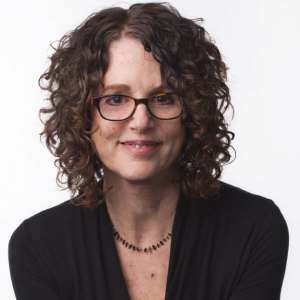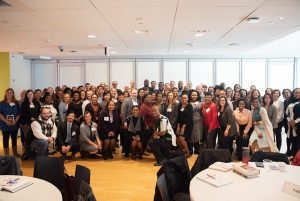 On racism as the status quo:
On racism as the status quo:“The status quo of our society is racism. That’s the status quo. That is the norm. That is not an aberration. Racism is not an aberration. It is the norm 24 – 7 – 365 – all of our institutions effectively and efficiently reproduce and maintain racial inequality, and I as a white person move through a society in which racism and racial inequality is the norm. I move through that society in racial comfort 24 – 7. It is rare for me to be outside my racial comfort zone and most of my life I’ve been working not to go outside my racial comfort zone. So I can easily avoid experiencing racial discomfort. So we are not going to get where we need to go from a place of white comfort. The key is what we do with our discomfort. And we can certainly use it as a way out.”
On anti-blackness:
“So I want to be really clear – all peoples who are not perceived or defined as white, experience racism in this country and in any Western-oriented colonial settler environment. And they experience it in ways that are shared that they would relate to with one another. They also experience in ways that are very specific and particular to their group…and having said that, at this point in my work, I feel very clear about the following: there is something profoundly anti-black in this culture. And in the white mind, black people are the ultimate racial ‘other.’ There are two poles, white is on one end and black is on the other. And where you are positioned along that pole or continuum, that positioning shapes how you experience your racialization, and anti-blackness runs across that entire continuum. Even black people have received the messages of anti-blackness. Right? Sometimes this is called colorism. So the darker you are, the more compounded is the oppression.”
On the institution of racism:
“So, I’m going to give you just one glance at the trajectory of anti-blackness from the beginning of this country to the current time…It begins with kidnapping and 300 plus years of enslavement, torture, rape and brutality. And it carries on… you see bans on testifying against whites, which made it technically legal to murder black people in this country. And you are now in my lifetime… this has nothing to do with whether my ancestors owned enslaved Africans…we’re at employment discrimination. And now we’re at 2020 with copious empirical evidence…employment discrimination, educational discrimination, biased laws and policing, white flight, subprime mortgages, mass incarceration, school to prison pipeline, disproportionate special education, referrals and punishments, testing, tracking, school funding, biased media, voter suppression, cultural mockery, historical emissions, unaddressed trauma and so on. It is a system. It is the system we’re in. Nobody was, and nobody could be exempt from this system. And this system is not interrupted by smiling. The system is not interrupted by good intentions and friendliness. Only strategic, intentional antiracist action can interrupt the system. And African Americans are not, and have never been in a position to do this to the entire white collective. But the white collective has always been in a position to do this to the entire African American collective or black collective, and to benefit from the outcome of doing this. So there is no such thing as reverse racism. I do not use these terms interchangeably. I reserve the term racism to describe an action that is backed with this kind of institutional power in history.”
On racism as a worldview:
“So I’m going to be really blunt right now. As a result of being raised as a white person in this society, I have a racist worldview. There’s no way I could not have absorbed a racist worldview because it’s infused in everything. And as a result, I have developed racist frameworks of understanding and I have developed racist patterns of engagement. I also have investments in racism, because it’s comfortable, It has served me, it has absolutely helped me navigate the struggles I have faced – because I’m not saying white people don’t suffer or face struggles, but we don’t face that one, and not facing that one helps us navigate the ones we do face. So I am the least trustworthy to assess how well I’m doing given my investments in the status quo of racism. Now, I did not choose to be socialized that way. I would never have chosen to be socialized that way. But I wasn’t given a choice. So I sincerely do not struggle with guilt. And I’m not trying to invoke guilt. It’s a natural part of the process of coming to awareness about this as a white person, but we’ve got to move through it or it just functions to hold everything up…I don’t feel guilt about this, but I do feel something, and that is responsible. I feel responsible for the outcome of having been conditioned into racism that I have ownership of. And it’s actually incredibly liberating, transformative, to just start from the assumption that of course, you have internalized all of this, have patterns of engagements, have investments in the status quo of racism, and then you can just stop defending, deflecting, denying, and just get to work trying to figure out how that conditioning is manifesting in your life, work and relationships.”
On the feeling of hopelessness:
“Yes, I feel hopeless at times…it’s like it serves me as a white person to be hopeless. Because what do I want to do when I feel hopeless? Give up. And then great, the status quo continues on and I benefit from it. So I don’t get to go there. I have to push through that and keep struggling.”
On how to start addressing white privilege:
“What do I do? I have a response that is a challenge… If you’re white and that’s your question right now, my question back to you is, ‘How have you managed to be a fully functioning professional adult in some form of leadership and not know what to do about racism? How have you managed not to know when the information is everywhere, when they’ve been telling us forever, when anything I have the remotest interest in finding out more about, what would I do? Google it.’ I’m trying to challenge that this is some kind of neutral thing that we are innocent and we just don’t know. I actually think there’s a willful not knowing that it takes actual energy and navigation to push away. So that’s my challenge to that question, but it’s also sincere… If you’re white and just take out a piece of paper and start writing down why you don’t know what to do, you will actually have your map. Nothing on it will be quick or easy, but everything on that list you can address. Number one: I wasn’t educated on racism. Well, we know what to do there. Number two: I don’t talk about race with the white people in my life. Okay. Number three: I don’t talk about race with people of color in my life. Number four: I don’t have people of color in my life. Number five: I haven’t really cared enough to find out. Number six: I don’t want to feel guilty. Whatever is on your list. There it is. Get to work. You can do it.”
 Most of our current laws, regulations, policies and practices in areas like housing, health-care, education and law enforcement were established, or justified, in part because of assumptions about what is normal, appropriate or desirable. These assumptions tend to reflect dominant cultural narratives or norms – for example, what constitutes a “family,” who is dangerous, which groups are deserving of societal support and which are not, etc. Over time, the consequence of laws, regulations, policies and practices is a multigenerational system of inequity. This system reinforces stereotypes and access to organizational and system power. When these assumptions are codified into laws, system policies and organizational and community practices, they are part of what creates persistent advantages for some groups and persistent disadvantages for others.
Most of our current laws, regulations, policies and practices in areas like housing, health-care, education and law enforcement were established, or justified, in part because of assumptions about what is normal, appropriate or desirable. These assumptions tend to reflect dominant cultural narratives or norms – for example, what constitutes a “family,” who is dangerous, which groups are deserving of societal support and which are not, etc. Over time, the consequence of laws, regulations, policies and practices is a multigenerational system of inequity. This system reinforces stereotypes and access to organizational and system power. When these assumptions are codified into laws, system policies and organizational and community practices, they are part of what creates persistent advantages for some groups and persistent disadvantages for others.
 On racism as the status quo:
On racism as the status quo:





Leave a Reply
Want to join the discussion?Feel free to contribute!